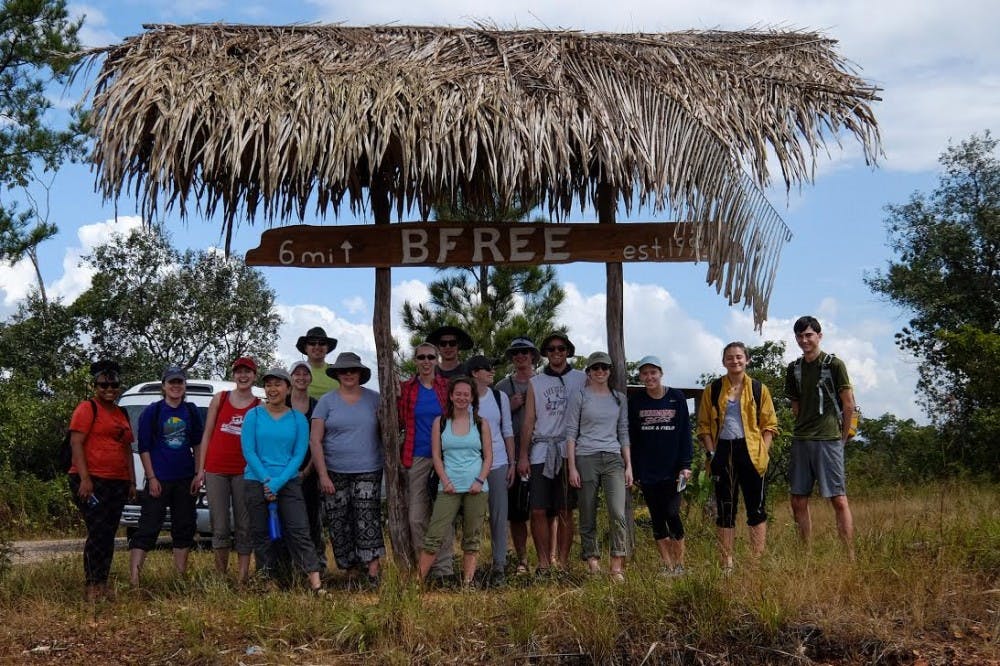While most people were tanning on a beach or relaxing at home over spring break, 14 ambitious students were battling endless heat, mud and mosquitos.
But for this Field Ecology class, every long hike, sweat stain and bug bite was worth the trip to Belize, where they got to bring classroom techniques to the tropical rainforest.
Professors Kristine Grayson and Amy Treonis organized and co-taught this class for the first time this semester. Interested students had to be accepted into the program through a competitive application process. About half of the students who applied were selected.
Treonis said they looked for students with a deep interest in field ecology who were seriously considering it as a career path. They also considered previous international travel experience and interviewed students to make sure they were ready for the challenges the trip would present.
“We wanted people who were passionate about the subject,” Treonis said.
After spending the first half of the semester learning about working in the field and preparing for the trip, the crew embarked at the start of spring break for a nine-day excursion.
“We weren’t staying at any resorts with swimming pools or anything like that,” Treonis said. “It was pretty rustic, but that was fine because we were out in the field, and that’s what it’s like.”
The field station that provided lodging and research assistance to the class, Belize Foundation for Research and Environmental Education (BFREE), is in the middle of a large area of preserved rainforests in Belize.
“It’s always great to do research in a different place,” said Sarah Timko, WC’ 17, a student who went on the trip. “And since things near the equator are really high in biodiversity, that’s where you’d want to go to be so close to all the plants and all the animals, all in one spot. It’s really great.”

Enjoy what you're reading?
Signup for our newsletter
During the trip, the class split into three groups to focus their research on large mammals, small mammals and leaf cutter ants with cameras, traps and other techniques. But capturing data was far from easy. From wearing long sleeves and long pants in sweltering heat to being woken by howler monkeys at 3 a.m., the trip had its trials.
“There were also a lot of parts of the trip that were challenging, like we had to hike six miles to the rainforest station to get there,” Timko said. “But everyone was sort of into it.”
Megan Barrett, WC' 17, another student who went on the trip, shared this sentiment.
“Everyone had had some sort of experience doing field research before," Barrett said. “We weren’t just starting as novices. We had a lot of background that really helped the trip go smoothly."
Barrett said one her favorite parts of the trip was bonding with students who she otherwise may not have gotten to know because of different class years or social circles.
“They found out that even though there were differences among them, they shared a love for field ecology,” Treonis said.

Because this trip offered students such valuable real-world experience, Treonis said they had ensured it was need-blind, and that all costs would be covered. She said that ordinarily a travel fee for a course like this could be more than $2,000, but that they had not wanted to exclude students for financial reasons.
Although the expenses were covered this time, the science department does not have the funds to support a field ecology trip every semester. This pilot trip may be the only one of its kind, at least for a while.
“These travel experiences are extremely impactful, and I think they should be available outside of SSIRs for students,” Treonis said. “Especially in a major, as a capstone experience, I think that’s super powerful.”
Contact reporter Missy Schrott at missy.schrott@richmond.edu. Follow her on Twitter at @missy_schrott
Support independent student media
You can make a tax-deductible donation by clicking the button below, which takes you to our secure PayPal account. The page is set up to receive contributions in whatever amount you designate. We look forward to using the money we raise to further our mission of providing honest and accurate information to students, faculty, staff, alumni and others in the general public.
Donate Now



